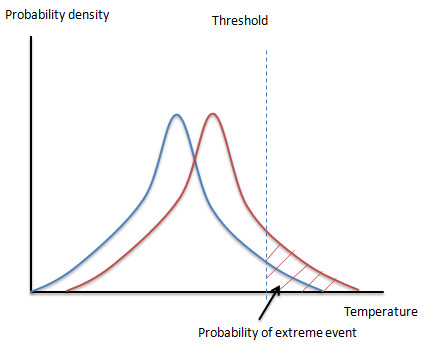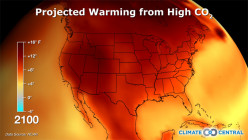Largest natural disaster area in the history of the U.S.
Most of the corn and soybeans I've seen here in central Indiana is stunted. The corn's tasseled, but ears are small. Grain prices are rising and will continue to rise.
http://www.climatecentral.org/news/drou … 6-states//
Is man-made global warming making the probability of extreme weather events like droughts more likely?My guess? I don't think so. The dust bowl ere was worse and went on for several years back in the 1930s. This year's drought isn't as bad yet as 1988. I live in the midwest, and we rural people just assume every decade or so there is going to be a bad drought here. It is bad this year, but not worse than has happened several times in my 50 years.
Beyond that, my Ag professors warned us that the 20th century was an unusually pacific time weather-wise. They warned us to expect that to change. We are just used to nice weather, because the last 100 years were freakishly good.I agree there have been worse droughts, but none so large as the current drought we're in. In 2010, records were set all across Russia with high temps and little rainfall. Commodity prices went through the roof due to conditions in Russia, which doesn't produce nearly as much grain as the U.S.
Last year, Texas had a record drought and wildfires. Researchers from the U.S. and Britain (NOAA and AWS - http://www.climatewatch.noaa.gov/articl … highlights) concluded the probability of extreme events like this have increased 20 fold due to manmade global warming. Personally, I like relying on good, old-fashioned data in assessing anything and a 'fat tail' - increase in the probability of an outlier event - is evident.
Normal distribution:
Right-shifted curve:
Notice the increase in area under the tail. That area is 20 times larger due to manmade global warming.
Now take a look at the Russian heat wave of 2010:
Look at where 2010 falls in a normal tail in image above. This summer in the U.S. also falls at the far, far end of a normal tail. It's an anomalous event since it's more -way more - than 3 standard deviations to the right.
Measured temps show the shift across the last 60 years:
Finally, what temps might be in 2100 based on current data and fossil fuel use:
If you look through earth’s history you will see that it goes through cycles. We have experienced this type of weather before time and time again. When we start going through another “little ice age” will it be mankind’s doing also?
I think it’s time that human’s start using our head. We can irrigate our crops. Why not, the ancient people did so. We also have the technology to get fresh water from salt water; there is no reason as to why a company cannot open a distillery in Texas and use the gulf water to help the drought stricken areas in the Midwest. It would create much needed jobs, save our crops and cattle. Who knows, with the extra water in the atmosphere, it might prevent drought in other areasI agree with you Kathy, irrigation is an important agricultural technology that man has been utilizing for centuries. However, as far as the plants are concerned, there really is no substitution for good rainfall.
It sure seems like extreme weather events are coming more fast and furious in the last couple of years, doesn't it?
But regardless, the drought is real and its impact must be mitigated.
The reality is, even if these extreme conditions have had historial precedents, they have never had historical precedents impacting this many people.I agree with tmbridgeland generally - this is natural cycles. The basic issue is thesame as building in flood plains, you are going to get flooded, trying to turn grassland into farmland you are ging to get burned. For me the issue is one of the overwhelming arrogance of man in going against the natural order without completing the science that might make the change possible. Where is the technology to deal with the drought cycle ?? All I see are bankers getting the land for nothing in a drought and selling it to fools when it is green, over and over again.
- JaxsonRaineposted 11 years ago
0
I know that on the subject of tornadoes, the incidence rate isn't increasing and hasn't been for at least the last 100 years.
But, if you just look at a chart of reported tornadoes per year, you see a huge spike in the late 90s(IIRC).
That spike was an increase in the number of reported F1 tornadoes as NWS put in hundreds of new doppler systems. Tiny tornadoes that nobody would report, but were picked up by machines.
F2-F5 tornadoes, have basically been going at the same rate(possibly dropping).
Usually when the media starts reporting that we are setting records, it's more to do with better reporting than any real change. But, their job is to get our attention.Droughts typically don't produce a lot of tornadoes. I'm not sure how tornadoes prove or disprove global warming, since they're isolated events and not weather patterns.
There is no global warming. And the drug companies and their handmaidens at the FDA, tell you their drugs are all safe. And then after a while it's too late, for many who develop some fatal side-affect.
Related Discussions
- 17
Is Global Warming Changing Atlantic Hurricane Patterns as Predicted?
by Scott Belford 6 days ago
I put this subject under Economy & Government because global warming will have a major impact on both world economies and world governments.One of the many predictions made by global scientists about one the most damaging effects from increasing temperatures around the globe is an increasing...
- 42
Global Warming and its effects.
by Mike Russo 10 years ago
Do you believe global warming is causing the extreme weather conditions we are experiencing in the U.S? Please watch this video and then comment.http://www.youtube.com/watch?v=u7EHvfaY8Zs
- 180
Last 10 Years are Warmest in Modern History
by TimTurner 14 years ago
According to a new report, "The last 10 years are the warmest 10-year period of the modern record," said NOAA climate monitoring chief Deke Arndt.http://news.yahoo.com/s/ap/20091026/ap_ … al_coolingIt doesn't matter if you believe in global warming or not, the ice caps are melting...
- 289
The Great Global Warming Scam - The Ice Age is Coming
by sannyasinman 13 years ago
An independent weather forecaster who tells the truth - a rare commodity . . . http://www.youtube.com/watch?v=hwyjsJJr … ded#at=164
- 38
Why do you not believe in Global Warming/Climate Change?
by Randy Godwin 6 years ago
Why do you not believe in Global Warming/Climate Change?I have no doubt our earth is warming at an alarming rate. One of the reasons I think this is because of the photo I included with the question. Otzi--the Iceman--was frozen over 5000 years ago and has remained that way through all sorts of...
- 166
Does Global Warming or Climate Change Really Exist?
by ThunderKeys 12 years ago
I'm confused. I've read and heard arguments that global warming is really just part of a natural temperature change process for the earth. I've also read that it's completely man-made? Is it one or both of these? Please explain.













